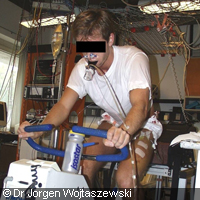EXGENESIS project sheds light on how regular exercise impacts well-being
Chronic health conditions like heart disease, obesity and type 2 diabetes are rearing their ugly heads in Europe, and researchers have been trying to figure out what steps are needed to put a lid on this problem. For the EXGENESIS ('Health benefits of exercise: identification of genes and signalling pathways involved in effects of exercise on insulin resistance, obesity and the metabolic syndrome') project, improving our understanding of the mechanisms that underlie the beneficial effects of exercise, is the key. The project, supported under the Sixth Framework Programme (FP6), has received EUR 12.7 million in funding. Humans can protect themselves against disease by exercising regularly and eating healthily, but the molecular mechanisms underlying the beneficial effects of exercise have so far been unclear. The 25-member EXGENESIS consortium is using a range of multidisciplinary approaches to elucidate these mechanisms. 'It was already known that regular exercise protected against the development of insulin resistance and type 2 diabetes, but the molecular mechanisms underlying this were poorly understood,' explained Professor Grahame Hardie, head of the Division of Molecular Physiology at the College of Life Sciences, University of Dundee, UK. 'We thought that we had the beginnings of an answer in that we had discovered some pathways, especially the AMPK (AMP-activated protein kinase) signalling pathway, that were activated by exercise in muscle,' he told CORDIS News. People who exercise regularly can cut their risk of developing type 2 diabetes by up to 50%. Exercise can also help a person live up to five years longer, research has shown. Professor Hardie commented that the AMPK pathway was recently identified as the probable target for the existing drug metformin, a current front-line treatment for type 2 diabetes that was derived from an ancient herbal remedy. EXGENESIS, a multidisciplinary study that has benefitted from the collaboration between universities, research institutes, hospitals and small and medium-sized enterprises (SMEs), has already made several achievements and discoveries since its launch in 2005. 'The relationships between physical activity and insulin resistance, type 2 diabetes and glucose homeostasis were addressed, using approaches spanning from the most basic, biochemical and molecular systems, to studies of animal models and human volunteers. Human studies included physiological and epidemiological studies of healthy subjects and of those at risk of developing type 2 diabetes,' Professor Hardie said. Within the field of genetic epidemiology, at least 16 novel genes predisposed to type 2 were identified by the project partners. 'Interestingly, where their function is known, most of these genes seem to be involved in the control of insulin secretion, with few having a potential impact on insulin action and insulin resistance,' the university researcher said. 'This supports the idea that the key defect of insulin resistance in type 2 diabetes is largely due to environmental rather than genetic factors, including physical inactivity,' he added. Thanks to their work, the researchers now know in molecular detail how AMPK is activated during exercise by two parallel mechanisms. 'One involves an increase in calcium ions, which is known to occur at the onset of muscle contraction,' Professor Hardie told CORDIS News. 'The other involves an increase in the signal molecule, AMP (adenosine monophosphate), which may occur later as the muscle uses up its supply of ATP and starts to fatigue.' The project partners succeeded in determining a molecular model of the structure of AMPK in complex with AMP. 'These insights may eventually allow the development of new drugs that mimic the beneficial effects of exercise,' Professor Hardie underlined. 'We now also better understand how AMPK activation stimulates glucose uptake into muscle,' he added. 'This is important because increased muscle glucose uptake is one of the beneficial effects of exercise, especially for subjects with type 2 diabetes who have a high blood glucose.' The EXGENESIS partners will disseminate the results via scientific publications and other means once the project ends in December 2009. 'We hope that our results may eventually improve the health of the whole population, via the development of new drugs, via better design of exercise interventions, via better targeting of treatments to "at risk" individuals, and by encouraging European governments to adopts policies that encourage higher levels of physical activity among the population,' Professor Hardie said.



